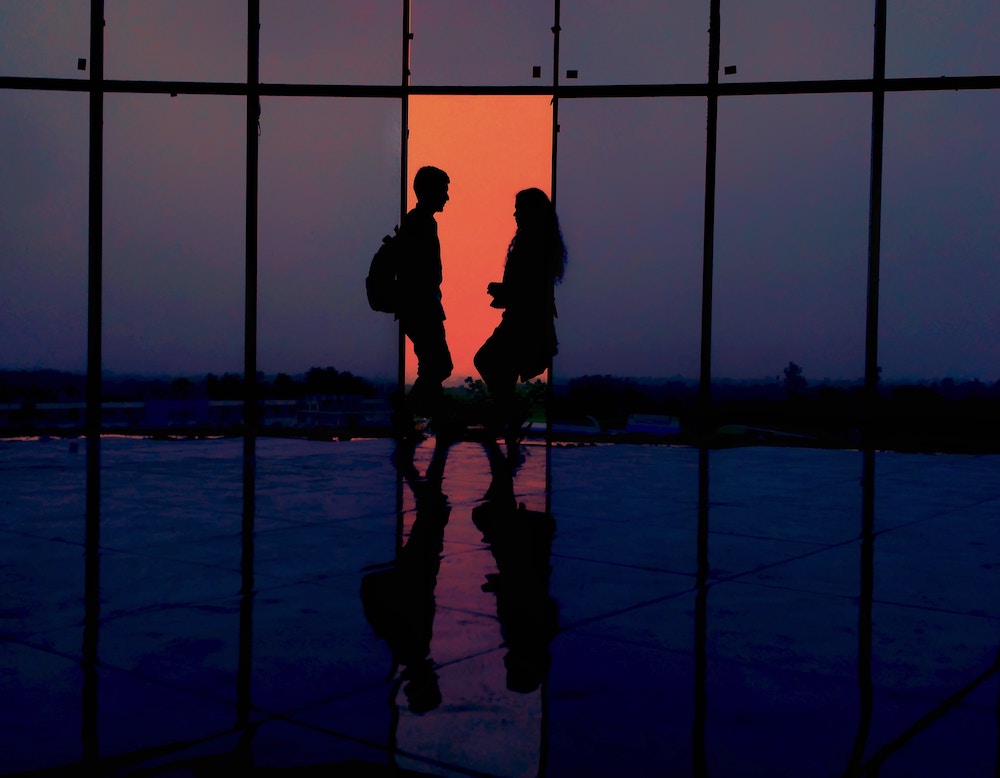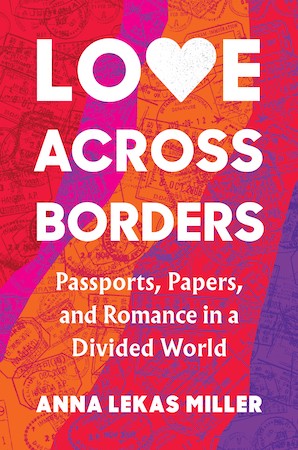Reading Lists
7 Novels About Falling in Love Across Borders
Anna Lekas Miller, author of "Love Across Borders," recommends romances that defy geographical bounds

I first fell in love with Salem in Istanbul, Turkey. We were both journalists and dreamed of seeing the world, and being the ones to witness and document history as it happened. There was just one problem: Salem was from Syria with a passport that essentially meant he was stuck in the Middle East. I was a U.S. citizen with the privilege to travel as I pleased.
While this was not a problem at first, it reared its ugly head when Salem was kicked out of the country—and deported to Iraq. Over the years, our journey together has been shaped by many forces—the Syrian civil war, the U.S. Muslim ban, and the war on ISIS to name just a few. I became uniquely acquainted with the ways that being suddenly uprooted and forced to adapt to a new country could affect two people in love. When we were forced to suddenly abandon the life we had built in Istanbul, I wondered if we would grow closer as we committed to being together, no matter where we were, or if we would become different, and eventually, unrecognizable versions of ourselves.
I set out to write Love Across Borders to explore how borders shape the love stories of so many, in so many different places. I gathered the real-life relationships of people like Mohammed and Amal, who stood up to the Muslim ban in order to be together, and Oscar and Darwin, who fled Honduras, only to be separated by ICE.
In order to write my book, I turned to authors who taken the kinds of topics that I was used to covering as a journalist and created fictional worlds around them to cut to the heart of the more important questions: What does it feel like to fall in love? What does it feel like to need to cross a border that you cannot cross?
Exit West by Mohsin Hamid
Even though Mohsin Hamid never names the country where Nadia and Saeed first fall in love, it feels so much like Syria. However, this country—that started as an ordinary place, where two people meet in an evening class on “corporate identity and product branding,” and then devolves into a civil war could so easily be somewhere else, as well.
Eventually, Nadia and Saeed decide to flee together, but they do not take buses and boats, the way that the refugees of our world might. Instead, they exit (west) through portals between worlds. The first one brings them to a tranquil island with sparkling sea feels like Lesbos; the second, to a bustling metropolis, where everyone lives on top of one another the way they might in London or New York. It feels like a more accurate way to represent the parallel universe between a war-torn neighborhood in Aleppo and the tranquil beaches of Lesbos than any news reporting—and creates the feeling of each place instead.
But instead of focusing on the cliché narratives of refugees—that once they are in danger at home, and then escape to happily ever after—Hamid explores the way that each place changes the couple, sometimes bringing them closer, other times driving them further apart. It is chillingly familiar—from holding hands through portals to the end, where they are no longer together, through no fault of their own save for having transformed into entirely different people than they were when they fell in love.
No Land To Light On by Yara Zgheib
No Land To Light On opens in Boston Logan International Airport. Sama is there to surprise her husband, Hadi, who is flying home from his father’s funeral in Amman, Jordan. But when she receives a call that he isn’t being allowed into the country, she suddenly grows faint—and has to be rushed to the hospital, as she realizes that she is going into premature labor.
A kind of magical thinking takes over. “This is not the right Sunday,” she says to herself, as she wakes up in the hospital. “Last Sunday, light flitted up and down the ridges of the covers, up your neck, onto your face. I tapped on the birthmarks, inventing constellations. You wouldn’t wake up, so I played the piano on your cheek.” Meanwhile, Hadi is being forced to sign a voluntary departure from, grimacing over his Syrian passport and the fate that it has befallen him. “Kuss ukht al jawaz al soori” he curses, the Arabic not translated until the footnotes. “Fuck my Syrian passport.”
But the book does not only follow the couple as they navigate their separation. Sometimes, we go back in time to witness them falling in love, those sweet moments where they forget that their country is at war and bask in the New England foliage, playfully pointing out that there is no equivalent word in Arabic. Other times, it explores the borders between them when they are in the same place—the way that they each process both the war and their exile differently, that Sama delights in imagining trips “anywhere in the world,” while Hadi wonders if he would need a visa in her imaginary scenarios.
Even though No Land To Light On is fictional, its characters—from Sama, heartbroken yet enamored with her newly born son in the hospital to Hadi, begging her to come to Amman with their son—are devastatingly real. Yara Zgheib deftly creates a world of a Syrian family in exile, coming into contact with the most hostile aspects of an allegedly promised land.
Lucky Boy by Shanthi Sekaran
When Solimar Castro Valdez arrives in Berkeley, California after a long and dangerous journey from Santa Clara Popocalco, Mexico, she discovers that she is pregnant.
“Pinche puta! What were you thinking? This is how you come to America?” her Silvia, who she is staying with, scolds her. “This is your big plan?”
But Soli resolves to work hard, and Silvia even hooks her up with a good job, cleaning houses for a wealthy, but overall kind family. When Ignacio is born, she falls in love harder than she has ever loved anyone before. However, when Soli is pulled over for a minor traffic offense, she is taken into ICE custody—and social services take away Ignacio.
Reading Lucky Boy feels like falling in love with both Soli and her son, and being simultaneously infuriated at everything that they have to experience, just to be together. Shanthi Sekaran deftly creates both Soli’s world—the details of being an immigrant, from the harrowing journey to the United States to the disorienting feeling of being invisible once she gets there, and the world of Kavya, the woman who eventually adopts Ignacio. Even though Soli is a clear protagonist, Kavya is far from a villain—she is painted as a complex and sympathetic Indian-American woman with her own struggles with her own infertility and loves Ignacio as her own. It makes for a complicated, gripping and viscerally story of love and borders—those that put a story like Soli’s in motion, and those that separate someone like Soli from someone like Kavya, and baby Ignacio, caught in between.
All The Rivers by Dorit Rabinyan
“Have you ever gone diving? Scuba or snorkeling?” Liat, a young woman from Israel living in New York asks Hilmi, who is from Palestine, the first time they meet. He is an artist and showing her his work, covered in blues and greens that remind her of the Mediterranean Sea, back home.
“There are three things that I do not know how to do—three things a man should know how to do,” he tells her, explaining that he can neither drive a car, nor shoot a gun. “And swimming,” he finishes. “I can’t swim. I was born and raised in Hebron—there is no sea there.”
The sea—the one that she had access to, and he did not—continues to be a motif throughout the book. Hilmi fantasizes about a world where they can all live in one country, and “learn how to swim—together.” As much as she loves the idea, Liat cannot imagine a world where that could happen. What would this one state solution mean for Israelis? Would Jews, like her family, who fled religious persecution in Iran, be safe in a world without a Jewish homeland. As much as they connect over their shared Middle Eastern culture, the familiar timbre of the Hebrew and Arabic words that they hear one another speak, these political differences create tensions—particularly when people that they know from “back home” come into their lives.
While borders would have physically keep Liat and Hilmi from meeting had they stayed in Israel and Palestine, New York provides a space for them to meet and fall in love, unencumbered by separation barriers and checkpoints. Nevertheless, Rabinyan Dorit is adept at portraying the ways that this separation continues to shape their relationship. At first there are the simple facts; Liat was a soldier while Hilmi was a political prisoner; she grew up with a fear of Arabs, while Hilmi grew up with a fear of Israeli soldiers and settlers. But as their story progresses, Dorit shows that this runs deeper.
Behold the Dreamers by Imbolo Mbue
What happens when a dream falls apart? This is the question that Imbolo Mbue grapples with as she tells the story of Jende and Neni, a young Cameroonian couple who come to New York City hoping to live their American Dream—one that they imagine as a country where anyone can be successful, no matter who they are—only for the stock market to crash, and their asylum cases to be rejected, their story quickly becoming an American nightmare.
As their story unfurls, Mbue deftly speaks to the ways that immigration creates the contours of a love story, from Jende deciding that taking Neni to the United States was the only way that he could prove to her family that he could be a successful man, worthy of her love, to the way that their relationship nearly falls apart under the pressure of striving for that success. It is both painfully specific in its details, from the jokes—(whenever responds to Jende saying he’s from Cameroon by mentioning some peripheral connection to a completely different African country, he responds by telling them he has an uncle in Toronto, and so forth) to the ripple effects of stress on a marriage, and the fear of losing everything that you love because of something outside of your control.
My First And Only Love by Sahar Khalifeh
Sahar Khalifeh’s “My First And Only Love” opens with Nidal, a rootless wanderer, returning back to the house she grew up in in Nablus, hoping to refurbish it into its former glory. As she sifts through boxes of memories, she brings the reader back to her teenage years, when she lived there with her grandmother when Palestine was still under the British mandate, and she was falling in love with a young revolutionary named Rabie.
Throughout the book, Khalifah seamlessly shifts from Nidal’s teenage narration to her modern self, showing how her experiences as a teenager shaped her perception as an adult. The present day—where Nidal now holds a western passport, and is worried that people have grown insensitive to news about Palestine—feels just as familiar as the descriptions of Palestine before the Nakba feel otherworldly. And yet, it is a reminder that both of these realities existed within many people’s lifetimes—and that as much as people fell in love in times of such extraordinary circumstances, these extraordinary circumstances often tore people apart.
A Long Petal of the Sea by Isabel Allende
A list of stories of love across borders would not be complete without a more historic example, and Isabel Allende’s A Long Petal of the Sea is exactly that, featuring not only a steamship journey across the Atlantic, a glimpse into the lives of Victor and Roser, a couple fleeing Fascist Spain for Chile, on a boat chartered by none other than Pablo Neruda.
As Allende vividly describes their journey—first, Roser’s long trek across the Pyranées mountains, months spent in a concentration camp along the French border, followed by a long steamship journey to a country that seemed as if it was “at the far end of the earth,” I thought about how this journey compares with the journeys of so many others today. There are tensions along the French border—the refugees are referred to as the “undesirables” and it is a reminder that anyone can become undesirable at any time. But the steamship journey—despite it lasting twenty-nine days—is ironically far safer than the journeys of many refugees today.
Once Roser and Victor arrive in Chile, they find themselves watching World War II unfold from afar, and continue to hope that someday, their homeland will be wrested from Fascist control. It makes me think of Syrians hoping for a world where Bashar al Assad is no longer President, Ukrainians longing for the retreat of the Russians. Ultimately, as they rebuild their lives, Allende explores the more intimate questions of exile, of being uprooted and yet simultaneously pushed closer together.










